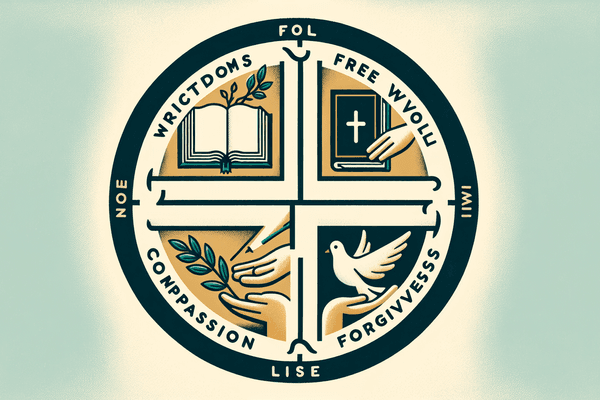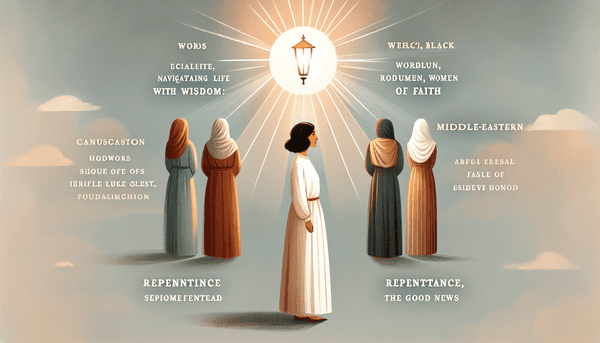The Practical Wisdom of the Book of James
The book of James stands out in the New Testament for its strikingly practical advice on Christian living. It's a letter that cuts to the heart of what it means to live out one's faith. James challenges believers to demonstrate their faith through action, reminding us that 'faith by itself, if it does not have works, is dead' (James 2:17). He emphasizes the significance of perseverance in trials, asserting that the 'testing of your faith produces steadfastness' (James 1:2-3), and ultimately leads to spiritual maturity and heavenly reward (James 1:12). The power of our words is another focal point in James' teachings, as he compares the tongue to a small fire capable of setting a great forest ablaze (James 3:5), urging believers to tame their speech and use it for good rather than harm.
The Concept of Free Will in the Bible
The interplay between God's sovereignty and human free will has long been a point of contemplation among theologians and believers alike. The Bible presents a God who is in control yet bestows upon humanity the dignity of choice. In the book of Deuteronomy, Moses presents a poignant choice to the Israelites: 'I have set before you life and death, blessing and curse. Therefore choose life, that you and your offspring may live' (Deuteronomy 30:19). This verse underscores the human responsibility to choose God's ways. The New Testament continues this theme, asserting that salvation comes through a personal decision to trust in Christ (Romans 10:9), and highlighting the transformative power of accepting Jesus' invitation to relationship (Revelation 3:20).
Seeking Forgiveness in Psalm 51
Psalm 51 is a profound expression of repentance and a plea for God's mercy. Attributed to King David after his sin with Bathsheba, this psalm captures the essence of a contrite heart. The psalmist pleads with God to 'blot out my transgressions' and 'wash me thoroughly from my iniquity' (Psalm 51:1-2), displaying an acute awareness of his failings and a deep yearning for spiritual renewal. He seeks not only forgiveness but also a transformation of his inner being, asking God to 'create in me a clean heart' and to 'renew a right spirit within me' (Psalm 51:10). The psalm illustrates the human capacity for remorse and the hope of restoration found in God's boundless grace.
FAQ
Q: What is the book of James about?
A: The book of James is a letter written by James, a leader in the early Christian church and the brother of Jesus. It offers practical wisdom for Christian living, addressing topics like trials and temptations, the use of our words, living out our faith through action, and the importance of prayer.
Q: Does the Bible discuss the concept of free will?
A: Yes, the Bible presents the idea of human free will while also emphasizing God's sovereignty. For example, Deuteronomy 30:19 highlights human choice and the responsibility to follow God's ways.
Q: Where should I start reading my Bible?
A: You can start reading the Bible from the Gospel of John in the New Testament. It provides a wonderful introduction to the life, teachings, and miracles of Jesus Christ.
Q: What was the significance of Jesus' words in John 19:26?
A: When Jesus spoke to Mary and John from the cross, He was ensuring that His mother would be cared for after His death and symbolizing the formation of a new spiritual family among His followers.






